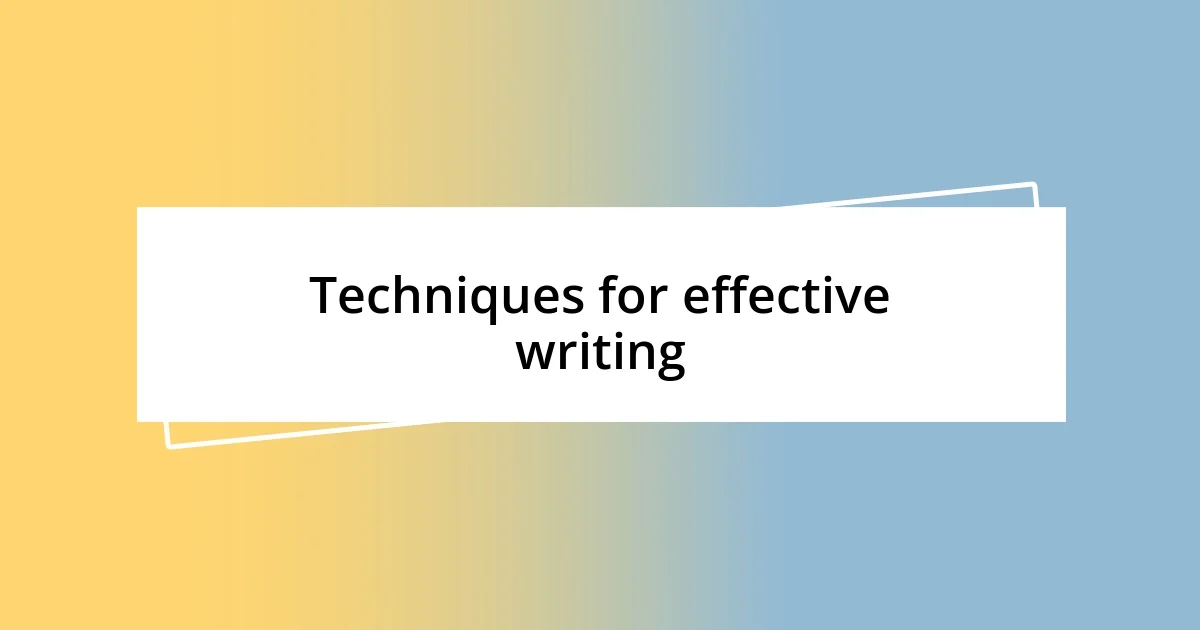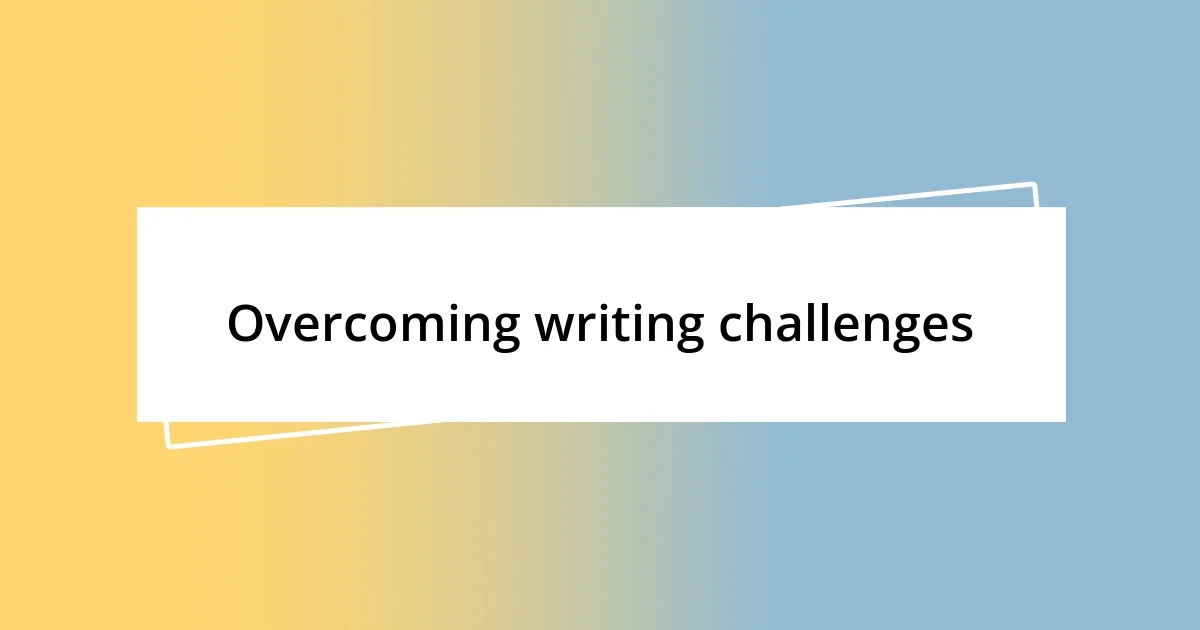Key takeaways:
- Influential writers possess key traits like authenticity, empathy, and resilience, allowing them to connect deeply with readers through their personal experiences and struggles.
- Classic authors impart valuable lessons in character development, language, and thematic depth, inspiring contemporary writers to explore complex emotions and societal issues.
- Overcoming writing challenges through practices such as embracing feedback, setting achievable goals, and applying sensory details can significantly enhance a writer’s craft and storytelling ability.

Understanding influential writers
Influential writers have the unique ability to shape our thoughts and perspectives. I remember the first time I read Maya Angelou’s “I Know Why the Caged Bird Sings” – it was a profound experience that opened my eyes to the struggles of identity and resilience. Isn’t it fascinating how a single book can change the way we see the world?
When I think about the power of influential writers, I often wonder what compels them to share their truths so boldly. There’s something deeply moving about the vulnerability they display, allowing readers to connect with their experiences. It’s as if they’re inviting us into their lives and encouraging us to explore our own stories.
Understanding influential writers means delving into their motivations, struggles, and triumphs. For instance, how did Virginia Woolf’s battle with mental illness shape her literary voice? Reflecting on their journeys helps me appreciate the depth and complexity of their work, reminding me that every word they penned was steeped in their own trials and triumphs.

Key characteristics of influential writers
Influential writers often possess a distinct set of characteristics that elevate their work and resonate with countless readers. One such trait is authenticity; they share their personal truths with a sense of honesty that can be palpable. I can recall reading Toni Morrison’s “Beloved,” where the raw emotion poured onto the page made me feel her characters’ pain and humanity intensely. It’s this fearless vulnerability that helps forge a genuine connection with readers.
Here are some key characteristics that define influential writers:
- Authenticity: They share their unique perspectives and experiences without holding back.
- Empathy: They deeply understand and articulate human emotions, allowing readers to find solace in their words.
- Courage: Tackling uncomfortable truths and societal issues head-on is often part of their narrative.
- Creativity: Their imaginative approaches to storytelling breathe life into familiar themes, making them feel fresh.
- Resilience: They often write from personal hardship, channeling their experiences into compelling narratives.
The ability of these writers to weave their struggles into stories can have a lasting impact on how we perceive our realities. When I reflect on my own writing journey, I find myself inspired by their courage to tackle difficult subjects and explore the nuances of the human experience.

Lessons learned from classic authors
Classic authors have taught me invaluable lessons about the power of narrative and character development. Reading Fyodor Dostoevsky’s “Crime and Punishment” was eye-opening; his exploration of moral ambiguity sparked a deep reflection within me. I realized that every character is a complex embodiment of conflicting emotions, pushing me to create more multidimensional characters in my own writing.
One key lesson I’ve drawn from classic literature is the significance of language and style. Jane Austen’s witty prose in “Pride and Prejudice” entertains while provoking thought on social norms. It inspires me to infuse my writing with sharp observations and humor, demonstrating how style can enhance meaning and engagement.
I also look to the thematic depth found in the works of authors like Gabriel Garcia Marquez. His “One Hundred Years of Solitude” teaches about the cyclical nature of time and history. This insight encourages me to explore broader human experiences in my writing, reminding me that our stories are often intertwined in unexpected ways.
| Classic Author | Key Lessons Learned |
|---|---|
| Dostoevsky | Moral ambiguity and complex characters |
| Austen | Witty prose and social critique |
| Garcia Marquez | Themes of cyclical time and human connection |

Techniques for effective writing
When I think about effective writing techniques, clarity stands out as essential. I’ve often struggled with the temptation to use fancy words, only to realize that simple, straightforward language communicates my ideas much more effectively. Have you ever found yourself rereading a sentence that just doesn’t land? I’ve been there, and it taught me that the goal is to convey meaning without making readers work too hard to understand.
Another technique I’ve adopted is the use of imagery. I remember writing a scene inspired by a walk through a sunlit forest; the way the light filtered through the leaves brought my words to life. This technique helps create vivid pictures in the reader’s mind. It’s not just about describing what’s there; it’s about evoking feelings and memories. When I ask myself, “What do I want my readers to see?” it guides me to paint a more engaging scene.
Finally, I can’t overstate the importance of revision. Initially, my drafts felt like a messy puzzle with pieces all over the place. With time, I learned that through careful revision, those pieces can fit together beautifully. This process allows me to refine my thoughts and strengthen my voice. It makes me ponder: what might I be overlooking in my earlier drafts? I’ve discovered that often, the magic happens during revision when I can truly sculpt my ideas into something cohesive and meaningful.

Building a personal writing style
Building a personal writing style is often like crafting a unique recipe. I remember the first time I experimented with mixing different influences; it felt exhilarating yet daunting. I took a page from Ernest Hemingway’s straightforward approach, combining it with the lyrical techniques of Virginia Woolf. This blend not only brought personality to my work but also gave me the confidence to explore my authentic voice. Have you ever tried blending styles? I find it’s a journey that reveals your preferences and strengths.
As I navigated through this process, I began to embrace vulnerability in my writing. There’s a certain magic in pouring my emotions onto the page, just like the raw honesty found in poetry. For instance, after experiencing a loss, I penned a piece that was both cathartic and revealing. It wasn’t just about the event itself, but how it shaped my perspective. Have you ever written from a place of pain or joy? Those moments often lead to the most profound connections with readers, inviting them into my world.
In my quest for a personal style, I’ve recognized the role of consistent practice. Initially, I wrote sporadically, and my voice felt scattered. But when I committed to daily writing, I discovered patterns emerging that defined my approach. I began to ask myself, “What themes resonate with me?” By honing in on personal interests, I noticed my writing gaining depth and cohesion. How often do we underestimate the power of discipline in shaping our unique narratives? It’s a powerful tool that can transform a fledgling writer into a distinct voice in the literary landscape.

Overcoming writing challenges
As any writer knows, facing challenges is part of the creative journey. I remember staring at a blank page for hours, feeling the pressure creep in. I often reflect on how important it is to embrace those moments of frustration rather than shy away from them. I’ve learned that taking a break or shifting my focus can often provide just the spark I need. Have you ever tried stepping away from your work? Just like stepping outside for a breath of fresh air can clear your mind, so too can a little distance from the page.
Another hurdle I’ve encountered is the fear of criticism. This fear used to paralyze me, stopping me from sharing my writing with others. I recall the first time I read a piece aloud to a group; my heart raced, and my hands trembled. But, with every reading, I grew more confident and receptive to feedback. Have you considered how constructive criticism can shape your growth as a writer? Understanding that feedback is a tool for improvement rather than a personal attack has completely changed my perspective.
Lastly, balancing writing with everyday life can feel overwhelming. I once juggled a demanding job while trying to maintain a writing routine, often feeling like I was failing at both. I discovered the power of setting small, achievable goals. One day, I promised myself to write just one paragraph during my lunch break. That small win motivated me, reminding me that every little step counts. Have you ever celebrated your small victories? It’s a reminder that progress doesn’t always have to be grand; sometimes, it’s the little things that build momentum on our writing journeys.

Applying skills in everyday writing
Applying the skills I’ve learned from influential writers into my everyday writing has transformed my approach significantly. For example, I often borrow from Ray Bradbury’s warm storytelling style, which encourages me to add sensory details that draw readers in. When I described a summer sunset recently, I could almost feel the heat of the sun on my skin and hear the distant laughter of children playing. Have you experimented with sensory details in your writing? It can create a vivid atmosphere that resonates with your audience.
Moreover, I practice the art of revision, inspired by the meticulous editing processes of authors like Stephen King. At first, I’d hesitate to change my original words, almost feeling a sense of attachment. But now, I see revision as a second chance to refine my thoughts and enhance clarity. During one of my recent projects, I slashed entire sections after realizing they didn’t serve the narrative. The result was a more polished piece that flowed beautifully. Isn’t it fascinating how letting go can elevate your work?
Finally, I embrace the power of dialogue, a technique I admired in the works of authors like Toni Morrison. I recall writing a short story where I crafted conversations that felt genuine and relatable, almost as if the characters were speaking from my own experiences. By focusing on natural speech patterns, I found that my character’s voices became more authentic and engaging. Have you ever taken time to really listen to how people speak around you? It can profoundly enhance your writing and make your characters leap off the page.












